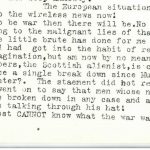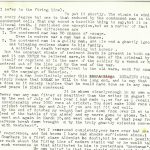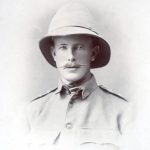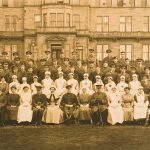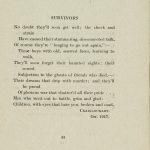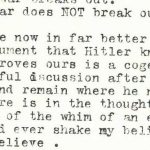This entry is quite different from those that we have focused on so far from Graham, with regards to the discussion being dominated by his own personal account of what it is like to experience war and to have to operate under the threat of constant danger and possible death.
Graham references an article which he has read the day prior in “The Scotsman” newspaper by Dr Chambers who is a Scottish alienist (psychologist) of the time. In this, Chambers seemingly expresses the opinion that no-one he had treated in recent times was affected by the rapidly alarming international situation of the day. Already dubious of this assertion, Graham concludes that “when he went on to say that men whose nerves broke down during the war would have broken down in any case and at the same period of time, I knew he was talking through his hat! He just CANNOT know what the war was actually like”.
We gain an insight into the pre-World War One life of Graham, in which he was a successful cricketer, playing at county level for Hampshire in 1905, and Worcestershire in 1909. His accounts of the contrasting circumstances in his life over just a matter of months, from playing cricket in August 1914 and never being “fitter and healthier”, to having war thrust upon him on the front lines and having lost three stone come October, is a similar experience shared by millions of others. Thomas had served long before then, holding rank as a captain during the Second Boer War in South Africa, but he considered “The Great War” to be of different proportions.
What he identifies as a major difference between the First World War and older conflicts, was the sustained nature of the war. The relentlessness of the campaigns and trench warfare meant that the priority was numbers. Soldiers were not able to have adequate time away from the conditions to try to cope mentally and physically, and those who were injured were “patched up” as quickly as possible and returned to duty. Thomas conveys his opinion that these conditions “to keep a man indefinitely under this BREAKING strain simply means that BREAK he WILL in the long end”.
World War One was the first conflict where post traumatic stress disorder (PTSD), known as “shell shock” at that time was first identified and considered. Over 80,000 British soldiers were treated for related symptoms during the course of the war, although modern estimates suggest up to 325,000 could have been affected by the condition. Shell shock manifested itself in different ways depending on the individual’s experience: such as facial tics, stomach cramps or the inability to speak.
Although there was, in the medical profession, many advancements into mental health work during this time and subsequently, the dominating reaction from the military and from the public to those affected was that they were weak or cowardly, or trying to avoid playing a further part in the conflict. One of the best known war-era poets, Siegfried Sassoon, wrote of this experience in his poem “Survivors” whilst receiving medical attention at Craiglockhart War Hospital in Edinburgh, which was providing groundbreaking treatment for the time.
Public attitudes did start to change as time progressed and the scale of the problem affecting the nation’s young heroes became apparent, with reform pushed for. The reaction to this came in the form of The Mental Treatment Act of 1930, but the time between the Armistice and its introduction indicates the level of priority given to the issue by the government.
A longstanding advocate of rearmament, Graham finishes the entry on a current note, expressing his relief that the country is in a better position to protect itself in the case of a war, but seems resigned to the fact that it is undoubtedly approaching. Although a religious man himself, he concludes that he hopes “nothing could ever shake my belief in God, but I can understand why many have ceased to believe”.
Sources used:
www.wikipedia.org
www.bbc.co.uk/history/worldwars
www.napier.ac.uk
http://www.bbc.co.uk/guides/z9g7fg8
